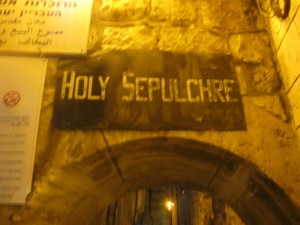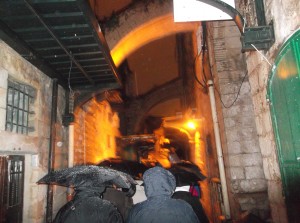The Child of Bethlehem is frail, like all newborn children. He cannot speak and yet he is the Word made flesh who came to transform the hearts and lives of all men and women. This Child, like every other child, is vulnerable; he needs to be accepted and protected. Today too, children need to be welcomed and defended, from the moment of their conception.
That was Pope Francis, speaking at none other than the birthplace of Jesus Christ. Headlines and photos of his visit to the Holy Land focused on the gestures. But be careful not to play caption games with photographs of Pope Francis, ignoring what is said and done in a fuller context (which is that of the Gospels).
That’s a good general rule with this pope.
And I say that not as just someone who happens to believe abortion is our greatest shame, the fruit of a culture content with indifference about who we are and why we’re here and where we are called to be headed to together.
I say that as someone who wants to save her soul.
People ask me to quit “spinning” for Pope Francis, when I point out that he is not the liberal progressive’s dream pope, that he isn’t a Marxist, and he won’t be presiding over gay weddings at St. Peter’s. (He tells us, also, by the way, not to ignore our brother — including the prisoner, the immigrant, the beggar, and anyone else you or I might have passed by or ignored today). In truth, I’m just trying to share what I know — what anyone can know by listening in.
I’ve become an evangelizer for the Vatican’s handy news website, news.va. On most weekdays, by the time most Americans are on their way to the office, there is a report from Vatican Radio with an English-language report on what the pope said in his morning homily at Santa Marta, where he resides. Each morning it presents a personal challenge …
I keep telling people, because it’s become my experience of him, that Pope Francis is an Ignatian spiritual director for the world, walking us through spiritual exercises, directing us to personal transformation, which could transform the world.
This was, in fact, his approach in Bethlehem.
we have to ask ourselves: Who are we, as we stand before the Child Jesus? Who are we, standing as we stand before today’s children? Are we like Mary and Joseph, who welcomed Jesus and care for him with the love of a father and a mother? Or are we like Herod, who wanted to eliminate him? Are we like the shepherds, who went in haste to kneel before him in worship and offer him their humble gifts? Or are we indifferent? Are we perhaps people who use fine and pious words, yet exploit pictures of poor children in order to make money? Are we ready to be there for children, to “waste time” with them? Are we ready to listen to them, to care for them, to pray for them and with them? Or do we ignore them because we are too caught up in our own affairs?
But if you were to look at most of the news reports and the photo wrap-ups, there were pictures of the Holy Father with politicians, with religious leaders, but his words seem to be lost. He is, of course, an effective pope of gestures. Embracing the disfigured man’s face. Holding the child. Going to confession right in front of rolling cameras at St. Peter’s, as if to say: I know I’ve been imploring you to know God’s mercy. But let me show you. I need it too! Thanks be to God for it.
As we listen to papal interviews, read excerpts of documents, and soundbite summaries of monumental trips, let’s be careful to not play reckless caption games with the images.
From a Mideast politics point of view, an exchange with Benjamin Netanayhu about what language Jesus spoke has been blown out of distracting proportion, even as the Pope acknowledged his own personal addition to the Sermon on the Mount to express his brotherhood with Israeli leaders and all people of good will. Pope Francis began his presidential visit with:
I thank you, Mr President, for your words of greeting and your welcome. With a touch of imagination, I would like to invent a new Beatitude, one I can apply to myself today: “Blessed is he who enters the house of a wise and good man”. I feel blessed. Thank you most sincerely.
If you read nothing else of his Holy Land trip, read what he said at Yad Vashem, Israel’s official Holocaust memorial, he said:
“Adam, where are you?” (cf. Gen 3:9). Where are you, o man? What have you come to? In this place, this memorial of the Shoah, we hear God’s question echo once more: “Adam, where are you?” This question is charged with all the sorrow of a Father who has lost his child. The Father knew the risk of freedom; he knew that his children could be lost… yet perhaps not even the Father could imagine so great a fall, so profound an abyss! Here, before the boundless tragedy of the Holocaust, That cry – “Where are you?” – echoes like a faint voice in an unfathomable abyss…
Adam, who are you? I no longer recognize you. Who are you, o man? What have you become? Of what horror have you been capable? What made you fall to such depths?
Certainly it is not the dust of the earth from which you were made. The dust of the earth is something good, the work of my hands. Certainly it is not the breath of life which I breathed into you. That breath comes from me, and it is something good (cf. Gen 2:7).
No, this abyss is not merely the work of your own hands, your own heart… Who corrupted you? Who disfigured you? Who led you to presume that you are the master of good and evil? Who convinced you that you were god? Not only did you torture and kill your brothers and sisters, but you sacrificed them to yourself, because you made yourself a god.
Today, in this place, we hear once more the voice of God: “Adam, where are you?”
From the ground there rises up a soft cry: “Have mercy on us, O Lord!” To you, O Lord our God, belongs righteousness; but to us confusion of face and shame (cf. Bar 1:15).
A great evil has befallen us, such as never happened under the heavens (cf. Bar 2:2). Now, Lord, hear our prayer, hear our plea, save us in your mercy. Save us from this horror.
Almighty Lord, a soul in anguish cries out to you. Hear, Lord, and have mercy! We have sinned against you. You reign for ever (cf. Bar 3:1-2). Remember us in your mercy. Grant us the grace to be ashamed of what we men have done, to be ashamed of this massive idolatry, of having despised and destroyed our own flesh which you formed from the earth, to which you gave life with your own breath of life. Never again, Lord, never again!
“Adam, where are you?” Here we are, Lord, shamed by what man, created in your own image and likeness, was capable of doing.
Remember us in your mercy.
Christian or Jew. Muslim or Agnostic. This Holy Father wants us to be who we are called to be: Sisters and brothers. Children of God.
Receive and recognize this. Be healed by and be instruments of Divine Mercy.
Don’t politicize this. Don’t miss this. And Christians, let’s be who we say we are already.











